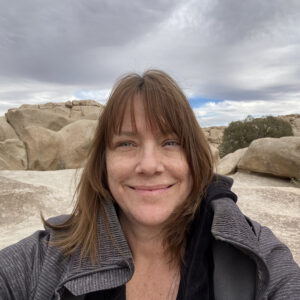Tuesday, November 4, 5 – 6 PM, Performing Arts and Humanities Building 231 (Dance Technology Studio)
Jayme McLellan is a curator, gallery director, artist, and educator. Over the past two decades, she has curated 150 solo, group, and thematic exhibitions of contemporary artists. In this presentation, she will share stories about successes and failures in her efforts to help artists become more professional so that they can have maximum freedom to carve out their own sustainable paths. She will discuss fostering long-term sustainability for artists, outlining unspoken expectations of professional presenting institutions and the wider public, as well as accessing available resources.
 Jayme McLellan is the founding director of Civilian Projects, a contemporary art gallery in Washington, D.C. that operated from 2006 – 2022 and supported hundreds of artists in exhibitions and public programs. She is currently serving as Acting Director of the Salisbury University Art Galleries, where she oversees exhibitions in two gallery spaces. Recent exhibitions she curated at SU include Muriel Hasbun: With the Pulse of a Community, Johab Silva: Electric Liquid, and Climate Stories. Jayme is the curator and co-editor of Hard Art DC 1979, a traveling exhibition and book (published by Akashic Books) about the early D.C. punk scene as depicted in photographs by Lucian Perkins, with writing by Alec MacKaye and Henry Rollins. Her first major curatorial effort was the Tandem Project (with artists from Slovenia, Bosnia and Herzegovina, Serbia, and Croatia), which led to the co-founding of Transformer DC, an organization that continues to operate and support emerging artists through local, national, and international projects and exhibitions. Jayme teaches courses on professional practices for visual artists at George Mason University and at Salisbury University. Her creative practice includes photography, video, and writing about the natural world, identity, family ties, and energy.
Jayme McLellan is the founding director of Civilian Projects, a contemporary art gallery in Washington, D.C. that operated from 2006 – 2022 and supported hundreds of artists in exhibitions and public programs. She is currently serving as Acting Director of the Salisbury University Art Galleries, where she oversees exhibitions in two gallery spaces. Recent exhibitions she curated at SU include Muriel Hasbun: With the Pulse of a Community, Johab Silva: Electric Liquid, and Climate Stories. Jayme is the curator and co-editor of Hard Art DC 1979, a traveling exhibition and book (published by Akashic Books) about the early D.C. punk scene as depicted in photographs by Lucian Perkins, with writing by Alec MacKaye and Henry Rollins. Her first major curatorial effort was the Tandem Project (with artists from Slovenia, Bosnia and Herzegovina, Serbia, and Croatia), which led to the co-founding of Transformer DC, an organization that continues to operate and support emerging artists through local, national, and international projects and exhibitions. Jayme teaches courses on professional practices for visual artists at George Mason University and at Salisbury University. Her creative practice includes photography, video, and writing about the natural world, identity, family ties, and energy.
This event is open for full participation by all individuals regardless of race, color, religion, sex, national origin, or any other protected category under applicable federal law, state law, and the University’s nondiscrimination policy.